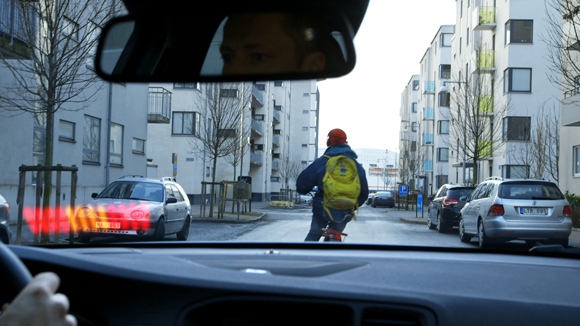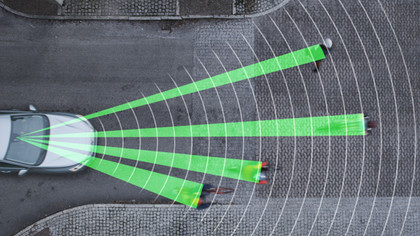Volvo debuts world's first cyclist detection system with full auto-brake
New safety feature adds to Volvo's already-high safety rating

Volvo is introducing the world's first cyclist detection system with full auto-brake, the company announced today, adding to its already five-star-rated safety features.
This is good news for cyclists who share the road with cars, especially in Europe. About 50 percent of all cyclists killed in European traffic have collided with a car, according to accident data cited by Volvo.
The Swedish manufacturer said that its new system can prevent collisions when a car and bike are headed in the same direction.
An instant warning and full braking power is applied to the Volvo car if the cyclist suddenly swerves out in front of the car and a collision is imminent.
The technology behind Cyclist Detection
Volvo's Cyclist Detection uses a sonar-like sensor system to scan the area ahead of the car, with a central control unit continuously monitoring and evaluating the traffic situation.
Aiding that central control unit is radar embedded into the car's grille to detect objects out in front and determine their distance.
At the same time this radar unit is doing its job, a camera fit into the rear-view mirror categorizes objects, be they pedestrians, cyclists, or other vehicles on the road.
Get daily insight, inspiration and deals in your inbox
Sign up for breaking news, reviews, opinion, top tech deals, and more.
Volvo said its early warnings are a credit to the dual-mode radar's wide field of vision and the camera's high resolution.
All of these advanced safety features will be made available starting mid-May 2013 in seven different Volvo models, the Volvo V40, S60, V60, XC60, V70, XC70, and S80.

The roadmap to 'cars that do not crash'
The Pedestrian and Cyclist Detection with full auto brake builds upon Volvo's innovative safety features introduced in past years.
Volvo debuted the first-generation auto-brake technology in 2006 and enhanced that safety feature with pedestrian detection with full auto brake in 2010.
"Our solutions for avoiding collisions with unprotected road users are unique in the industry," said Volvo Senior Vice President of Marketing and Sales Doug Speck in a press release.
"By covering more and more objects and situations, we reinforce our world-leading position within automotive safety. We keep moving towards our long-term vision to design cars that do not crash."
That vision may be complete with self-driving cars like the one that Volvo has tested.
